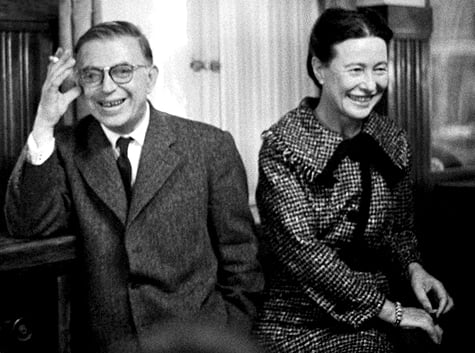Memoirs of a Dutiful Daughter by Simone de Beauvoir
By Taylor Jasmine | On July 17, 2018 | Updated December 3, 2020 | Comments (0)

Memoirs of a Dutiful Daughter by Simone de Beauvoir (1959) is the first of a multi-part autobiography series by a great intellectual and literary figures of the twentieth century. It depicts her early years growing up in a bourgeois French family, her adolescent rebellion against the convention and religious doctrine, and college education at the Sorbonne.
Toward the end of this memoir, she strikes out as part of an intellectual set in Paris in the 1920s and cements her lifelong open relationship with Jean-Paul Sartre.
Simone de Beauvoir’s friendships, early lovers, teachers, and mentors come to life in this vivid portrait of a fascinating and brilliant woman. It begins like this:
“I was born at four o’clock in the morning on the ninth of January 1908, in a room fitted with white-enameled furniture and overlooking the Boulevard Raspail.
In the family photographs taken the following summer there are ladies in long dresses and ostrich feather hats and gentlemen wearing boaters and panamas, all smiling at a baby: they are my parents, my grandfather, uncles, aunts; and the baby is me. My father was thirty, my mother twenty-one, and I was their first child.”
Following is a review of the English translation of Memoirs of a Dutiful Daughter, from 1959, the year that it came out in the U.S.
A 1959 review of Memoirs of a Dutiful Daughter
From the original review by John Barkham in the Tucson Daily Citizen, June 6, 1959: Both as a woman and as an intellectual, Simone de Beauvoir is very much sui generis. Men have played a part in her life, but mostly on an intellectual plane.
The truth is that Simone de Beauvoir had a mind superior to that of all the men she knew — except one. That one, Jean-Paul Sartre, was destined to play a significant role in her life.
Her formidable qualities of mind and insatiable intellectual curiosity made her something of a problem to her strictly bourgeois family. In this opening volume of her autobiography — a serious, revealing, and extraordinarily vivid book — she describes in detail her years growing up in a family that would have preferred a boy.
Her parents were reasonably well-to-do Parisians, who tried to raise her as a dutiful daughter and an obedient Catholic. Simone obliged in the first instance but her intelligence made it impossible for her to comply in the second.
. . . . . . . . . .

37 Quotes from The Second Sex by Simone de Beauvoir
. . . . . . . . . .
Challenging beliefs early on
The first thing that strikes the reader of this engrossing book is that its author apparently possesses powers of total recall. She can remember minute details of events that occurred when she was three years old.
She was only five when her questioning mind led her to wonder why “the all-powerful Christ child should prefer to come down the chimney like a common sweep at Christmas.” Her parents felt impelled to confess the deception.
Ever since, de Beauvoir has questioned face values and challenged beliefs. During World War I, she became a pacifist after seeing some of the horrors of war in her country. “Peace was more important to me than victory,” she recalled. In her teens, she had been taught “the vanity of vanity, the futility of futility.” This doctrine of meek acceptance, too, she discarded.
. . . . . . . . . .

Memoirs of a Dutiful Daughter on Bookshop.org*
Memoirs of a Dutiful Daughter on Amazon*
. . . . . . . . . .
Meeting Sartre
As a student at the Sorbonne, she began to mix with a group of brilliant left-wing intellectuals, the leader of whom was Sartre. She wasn’t quite sure what she believed in, beyond the fact that she detested the extreme right. Sartre attracted her enormously. “It was the first time in my life that I had felt intellectually inferior to anyone else.”
“From now on, I’m going to take you under my wing,” Sartre told me when he had brought me the news that I had passed (Sorbonne). He had a liking for feminine friendships. During the fortnight of the oral examinations we hardly ever left each other except to sleep. I was now beginning to feel that time not spent in his company was time wasted …
“Whatever happened, I would have to try to preserve what was best in me: my love of personal freedom, my passion for life, my curiosity, my determination to be a writer. Not only did he give me encouragement but he also intended to give me active help in achieving this ambition.”
. . . . . . . . . .

Simone de Beauvoir and Jean-Paul Sartre: An Existential Love Story
. . . . . . . . . .
An accomplished woman
In her twenty-first year, the book ends.
It is rare indeed that a woman of Simone de Beauvoir’s attainment bares her mind and heart. Everything in these pages has, of course, been filtered through the cool detachment of her memory, but one cannot withhold admiration for her unshakable poise, her zest for new ideas, the effortless ease with which she faces every challenge from whatever quarter it may come.
Yet this is not an austere self-portrait of a bluestocking; on the contrary, it breathes life, warmth, and a desire to know.
A contemporary conclusion
A 2014 review of Memoirs of a Dutiful Daughter on Whispering Gums pulls this discussion together with this conclusion:
“She believed in equality, she didn’t want to be constrained as she saw married women with children were, but she had not developed the ideas that she presented in The Second Sex, which she wrote around the age of 40.
Tellingly, Beauvoir-Sartre biographer Hazel Rowley writes that it was Sartre who told Beauvoir that if she were to write her memoirs she would need to look into ‘what it had meant to be a woman.’ Beauvoir was apparently dismissive, believing that being a woman had never really affected her but, she decided to do some research. What she discovered was “a revelation” and resulted in her putting her memoirs aside to write The Second Sex.”
. . . . . . . . .

You might also like: She Came to Stay by Simone de Beauvoir
. . . . . . . . .
*This post contains Bookshop Affiliate and Amazon Affiliate links. If the product is purchased by linking through, Literary Ladies Guide receives a modest commission, which helps maintain our site and helps it to continue growing!
Leave a Reply